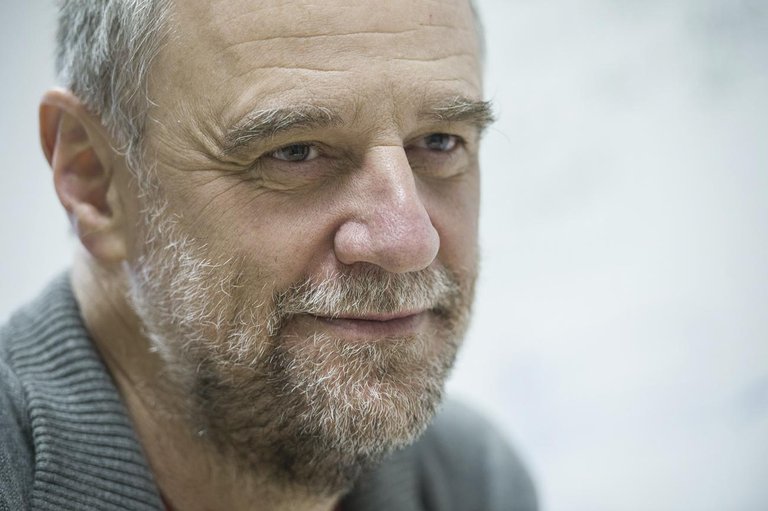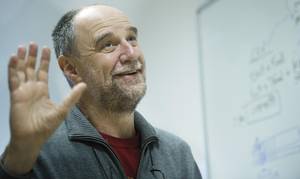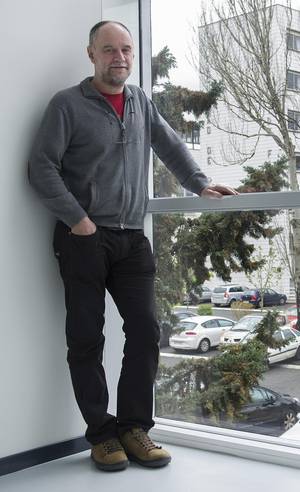"The network achieved through the EU has been very important to me, both personally and academically"

I am a computer professor and I am a researcher at the Ixa Group in language processing. In that I am and I want to take most of the time. In the last three years I have been Vice Dean of External Action; I have addressed the Langune Association and the UEU leadership team. I have now left the Vice-Dean and Langune to be able to assume the position of Director of the EU and continue the work I have here. Thus, teaching, research and administration combine all three areas.
I am in the Ixa Group and the only line is written language processing. We do not work with speech; in any case, we do it in writing and work with it. Within the written text there are several fields, some are somehow simple engineering problems, such as spelling correction, and others may be more complex.
It will soon be twenty years. Ixa has just turned 25 and two theses were released to found Xuxe. One was the computer thesis and another one by Mirian Urkia of UZEI. We went together doing the thesis and finished almost at once. He was born in Xuxe and succeeded, and is now making his way.
Yes, well, if it's easy, but not very easy. And when it seems that a word is wrong, it is not easy to decide whether it is right or wrong. And in case of error, what may be the most suitable word to replace it. It's not easy, so don't let the machine decide 100%. That is, although conceptually simpler, it is not fully resolved. But that's easier than machine translation.
In recent years we are quite involved. Now we have a project in Europe, led by Kepa Sarasola and I am in a group. It is called QTLeap: Quality Translation by Deep Language Engineering Approaches. In machine translation, statistical systems are imposed, one of the best known is Google Translate, but our path is not the same. What happens is that making a basic system is simple following the path of free software. This technique was developed in the IBM labs, it was published later, and although people initially looked with distrust, it has now been imposed and almost carried everything else ahead.
But now the trend has changed. It seems that this road has reached its peak. Therefore, we have to return to linguistic knowledge and somehow combine linguistic and statistical knowledge.
That is. Another strong line we have in the group is semantics, related to Wikipedia and WordNet. WordNet is a global ontology devised at Princeton University in the United States. It has hyperonyms, homonyms, synonyms, etc. and this ontology includes the relationship between words, but not in a specific language, but between abstract concepts, forming groups of meanings. This was initially mapped in English and then done in many other languages, including Basque.
The biggest problem is ambiguity, and in our group we have good specialists in semantic disambiguation, that is, to decide what a word means in its context.
In relation to semantics, we have been in a couple of European projects and, in general, we are dedicated to the extraction of information, that is, to convert the unstructured information that appears in the text into structured information. This allows finding other texts that may contain information similar to a specific text.
And the last big block would be the tools related to teaching. We have a subgroup in which we try to simplify the tools we develop to serve in teaching.
Berthsolarism is for us a beautiful problem, a challenge. It is an artificial intelligence problem related to local culture and the challenge is for a robot to show the behavior of a bertsolari. And in that we are. There are two theses in this line, one goes by the way of interaction, that is, directed to programming the voice, gestures, music and silences, and another to create the verse. The strategy we are testing is based on machine translation. Suppose all the parts are translated; to translate a new sentence you have to look for the translated parts and sew them together, according to the syntax, etc. We want to do the same with the verses: we have a great collection of verses and, with the proper verses, we sew them together in the most coherent way possible.
In short, what we do with the bertsolari robot is, on the one hand, testing new strategies and, on the other, combining them with artificial intelligence and other areas. On the other hand, we see that it arouses much more social interest than other topics, so it also serves us to disseminate.
Yes, for example, in machine translation many groups are working, conferences are held, many works are published... But other areas are also important. For example, minority languages are very important to us. Here is a community, SALTMIL (Speech And Language Technology for Minority Languages), and the management team is made up of Kepa Sarasola. Research is promoted, resources are shared, congresses and meetings are organized... with the aim of promoting the technological development of minority languages.
We speak of Quechua and Aymara, but it is not easy. Many times it happens in these territories: brave young people begin to work, sometimes they also get support, but then often go to work in larger places and leave the work they were doing. However, we have worked in collaboration with the University of Cuzco, we have a collaboration in teaching systems with Cuba, in Mexico we have recently made contacts with the Nahuatl language... Our goal is to share our experience with Basque and, as far as possible, to help others.
No doubt. We believe they should lead their process, but we want to offer them our experience because it can be useful. The main problem we have encountered is not technological, but sociolinguistic, especially lack of standardization.
In view of this, I believe that the process of creating the Basque batua and the standard language has been praised. Now some speak against unified Basque and say that dialects must be promoted, etc. And they have their motives, but we have to say the opposite: without standards, there is no future for a written language. When you go abroad you realize how important it is, so I like to emphasize.
It would enter 1984, by the hand of Kepa Sarasola, being euskaldun berri. And I have always had a great adhesion: I have made great friends, I have learned a lot and the network achieved through the EU has been very important for me, both personally and academically.
Yes, over time its function has changed. He was 41 years old when the UPV was founded and there was nothing in Basque at the university. There were teachers who taught their subjects in Basque, but at an organized level there was nothing. Then the EU was created and Karlos Santamaría took the first step to create this university that theorized. That is, the Basque, who recognized territoriality and all that. There Elhuyar was also at fault...
It thus became a benchmark of the Basque university. With the summer courses, he offered a space for the realization of the internships, since many of the teachers who taught the classes were students, or new teachers without training. He also made the editorial, was an agent generating material, terminology and content, and an oasis to live in Basque.
[With a very broad smile] I remember that at first he was in Baiona and Biarritz, especially in Baiona. And then, for many years, summer courses were one of the landmarks of the Basque militants in Pamplona. Many euskaldunberris were going to practice there.
This was a relatively long phase, but gradually a process of Euskaldunization began in conventional universities and, above all, in the UPV/EHU, in which students had a greater opportunity to learn Basque. Therefore, as they studied Basque, the offer of the EU was not very interesting for them. Therefore, there was an evolution that began to give other content in the summer courses, complementary to the one given at the university, to attract people.
After a while, it was observed that in summer courses fewer people met than before, and that it was necessary to expand the offer throughout the year, in line with continuing education or throughout life. At the same time, compaction was carried out in the different areas of knowledge, such as the meeting of computer scientists, or the natural sciences that has existed recently. These types of actions have been carried out throughout the year and have been taught uninterrupted courses. We continue with the summer courses, but with another perspective and also work all year round. That was the second step.
The third one has already started and is to offer online courses. Not only for lifelong training, but also for grades and postgraduate degrees. This coincides with our strategic line of creation of the Basque University, which we believe has not yet been achieved.
In this strategic area there is a great vacuum. In face-to-face learning, through UPV/EHU and Mondragon Unibertsitatea, there is the possibility, but there is nothing in non-face-to-face or online learning. That is not transferable, it has been many years since universities began to Euskalduniarse and no step has been taken.
About ten years ago, the EU conducted with the Basque Government and the Universitat Oberta de Catalunya (UOC), but it did not go ahead. Now we are working with the Provincial Council of Gipuzkoa a proposal that only the EU can not do, but the idea is that within two or three years there is something going on, offering official degrees and postgraduate degrees. Now the EU cannot give official degree, but for us it is strategic and we are working to achieve it. We must socialize this need, since there is no possibility that there is nothing, especially when it is increasingly important to have the opportunity to receive lifelong training.
In the long run, the ideal would be to create a UOC in Euskal Herria. UNED is a remote university, its name indicates it; UOC is open, open, and we say online, somehow, to indicate the connection between teachers and students. We want to use technology so that the student is close, although physically far away, because that closeness is very important, especially in long studies. It is essential to create a dynamic to engage the student and encourage him to continue his studies. That is our goal.
There are three or four years thinking of a meeting of young researchers, but we have not been able to carry it out because of economic problems. Now it's about celebrating it in spring 2015, along with others, and doing it every two or three years to regain the spirit of the initial EU internship. In fact, there are many young Basque researchers in research centers, universities and companies, spread all over the world, but I think what happened to us: they are related to their area and those around them, but they do not have a network with other knowledge. We want to help you create this network.
Buletina
Bidali zure helbide elektronikoa eta jaso asteroko buletina zure sarrera-ontzian













